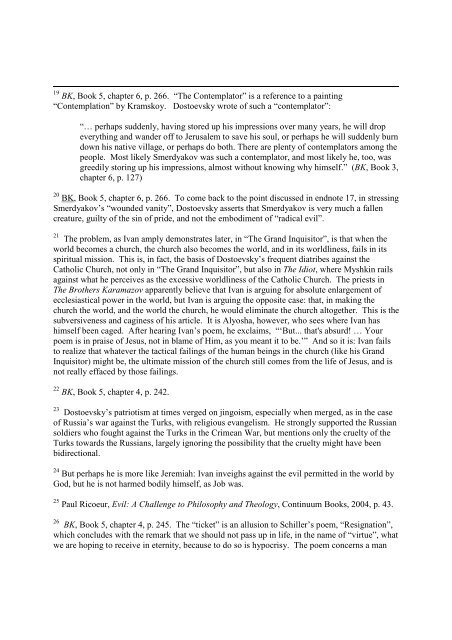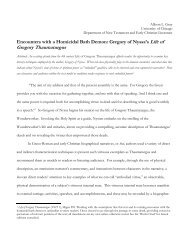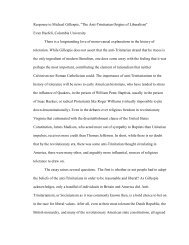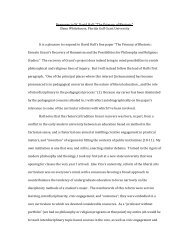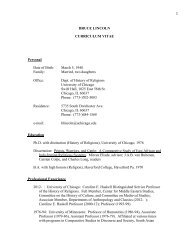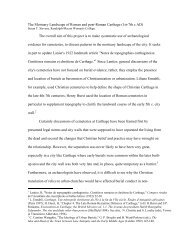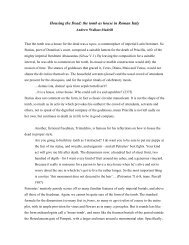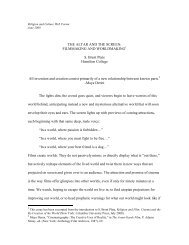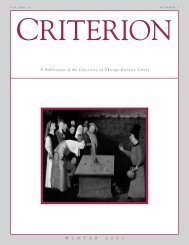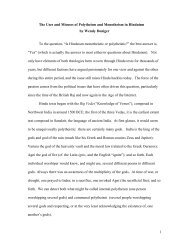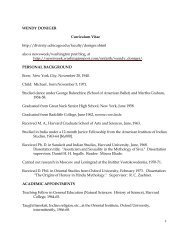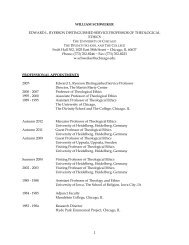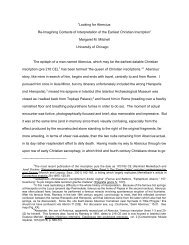The Reification of Evil and The Failure of Theodicy: The Devil in ...
The Reification of Evil and The Failure of Theodicy: The Devil in ...
The Reification of Evil and The Failure of Theodicy: The Devil in ...
Create successful ePaper yourself
Turn your PDF publications into a flip-book with our unique Google optimized e-Paper software.
19 BK, Book 5, chapter 6, p. 266. “<strong>The</strong> Contemplator” is a reference to a pa<strong>in</strong>t<strong>in</strong>g<br />
“Contemplation” by Kramskoy. Dostoevsky wrote <strong>of</strong> such a “contemplator”:<br />
“… perhaps suddenly, hav<strong>in</strong>g stored up his impressions over many years, he will drop<br />
everyth<strong>in</strong>g <strong>and</strong> w<strong>and</strong>er <strong>of</strong>f to Jerusalem to save his soul, or perhaps he will suddenly burn<br />
down his native village, or perhaps do both. <strong>The</strong>re are plenty <strong>of</strong> contemplators among the<br />
people. Most likely Smerdyakov was such a contemplator, <strong>and</strong> most likely he, too, was<br />
greedily stor<strong>in</strong>g up his impressions, almost without know<strong>in</strong>g why himself.” (BK, Book 3,<br />
chapter 6, p. 127)<br />
20 BK, Book 5, chapter 6, p. 266. To come back to the po<strong>in</strong>t discussed <strong>in</strong> endnote 17, <strong>in</strong> stress<strong>in</strong>g<br />
Smerdyakov’s “wounded vanity”, Dostoevsky asserts that Smerdyakov is very much a fallen<br />
creature, guilty <strong>of</strong> the s<strong>in</strong> <strong>of</strong> pride, <strong>and</strong> not the embodiment <strong>of</strong> “radical evil”.<br />
21 <strong>The</strong> problem, as Ivan amply demonstrates later, <strong>in</strong> “<strong>The</strong> Gr<strong>and</strong> Inquisitor”, is that when the<br />
world becomes a church, the church also becomes the world, <strong>and</strong> <strong>in</strong> its worldl<strong>in</strong>ess, fails <strong>in</strong> its<br />
spiritual mission. This is, <strong>in</strong> fact, the basis <strong>of</strong> Dostoevsky’s frequent diatribes aga<strong>in</strong>st the<br />
Catholic Church, not only <strong>in</strong> “<strong>The</strong> Gr<strong>and</strong> Inquisitor”, but also <strong>in</strong> <strong>The</strong> Idiot, where Myshk<strong>in</strong> rails<br />
aga<strong>in</strong>st what he perceives as the excessive worldl<strong>in</strong>ess <strong>of</strong> the Catholic Church. <strong>The</strong> priests <strong>in</strong><br />
<strong>The</strong> Brothers Karamazov apparently believe that Ivan is argu<strong>in</strong>g for absolute enlargement <strong>of</strong><br />
ecclesiastical power <strong>in</strong> the world, but Ivan is argu<strong>in</strong>g the opposite case: that, <strong>in</strong> mak<strong>in</strong>g the<br />
church the world, <strong>and</strong> the world the church, he would elim<strong>in</strong>ate the church altogether. This is the<br />
subversiveness <strong>and</strong> cag<strong>in</strong>ess <strong>of</strong> his article. It is Alyosha, however, who sees where Ivan has<br />
himself been caged. After hear<strong>in</strong>g Ivan’s poem, he exclaims, “‘But... that's absurd! … Your<br />
poem is <strong>in</strong> praise <strong>of</strong> Jesus, not <strong>in</strong> blame <strong>of</strong> Him, as you meant it to be.’” And so it is: Ivan fails<br />
to realize that whatever the tactical fail<strong>in</strong>gs <strong>of</strong> the human be<strong>in</strong>gs <strong>in</strong> the church (like his Gr<strong>and</strong><br />
Inquisitor) might be, the ultimate mission <strong>of</strong> the church still comes from the life <strong>of</strong> Jesus, <strong>and</strong> is<br />
not really effaced by those fail<strong>in</strong>gs.<br />
22 BK, Book 5, chapter 4, p. 242.<br />
23 Dostoevsky’s patriotism at times verged on j<strong>in</strong>goism, especially when merged, as <strong>in</strong> the case<br />
<strong>of</strong> Russia’s war aga<strong>in</strong>st the Turks, with religious evangelism. He strongly supported the Russian<br />
soldiers who fought aga<strong>in</strong>st the Turks <strong>in</strong> the Crimean War, but mentions only the cruelty <strong>of</strong> the<br />
Turks towards the Russians, largely ignor<strong>in</strong>g the possibility that the cruelty might have been<br />
bidirectional.<br />
24 But perhaps he is more like Jeremiah: Ivan <strong>in</strong>veighs aga<strong>in</strong>st the evil permitted <strong>in</strong> the world by<br />
God, but he is not harmed bodily himself, as Job was.<br />
25 Paul Ricoeur, <strong>Evil</strong>: A Challenge to Philosophy <strong>and</strong> <strong>The</strong>ology, Cont<strong>in</strong>uum Books, 2004, p. 43.<br />
26 BK, Book 5, chapter 4, p. 245. <strong>The</strong> “ticket” is an allusion to Schiller’s poem, “Resignation”,<br />
which concludes with the remark that we should not pass up <strong>in</strong> life, <strong>in</strong> the name <strong>of</strong> “virtue”, what<br />
we are hop<strong>in</strong>g to receive <strong>in</strong> eternity, because to do so is hypocrisy. <strong>The</strong> poem concerns a man


